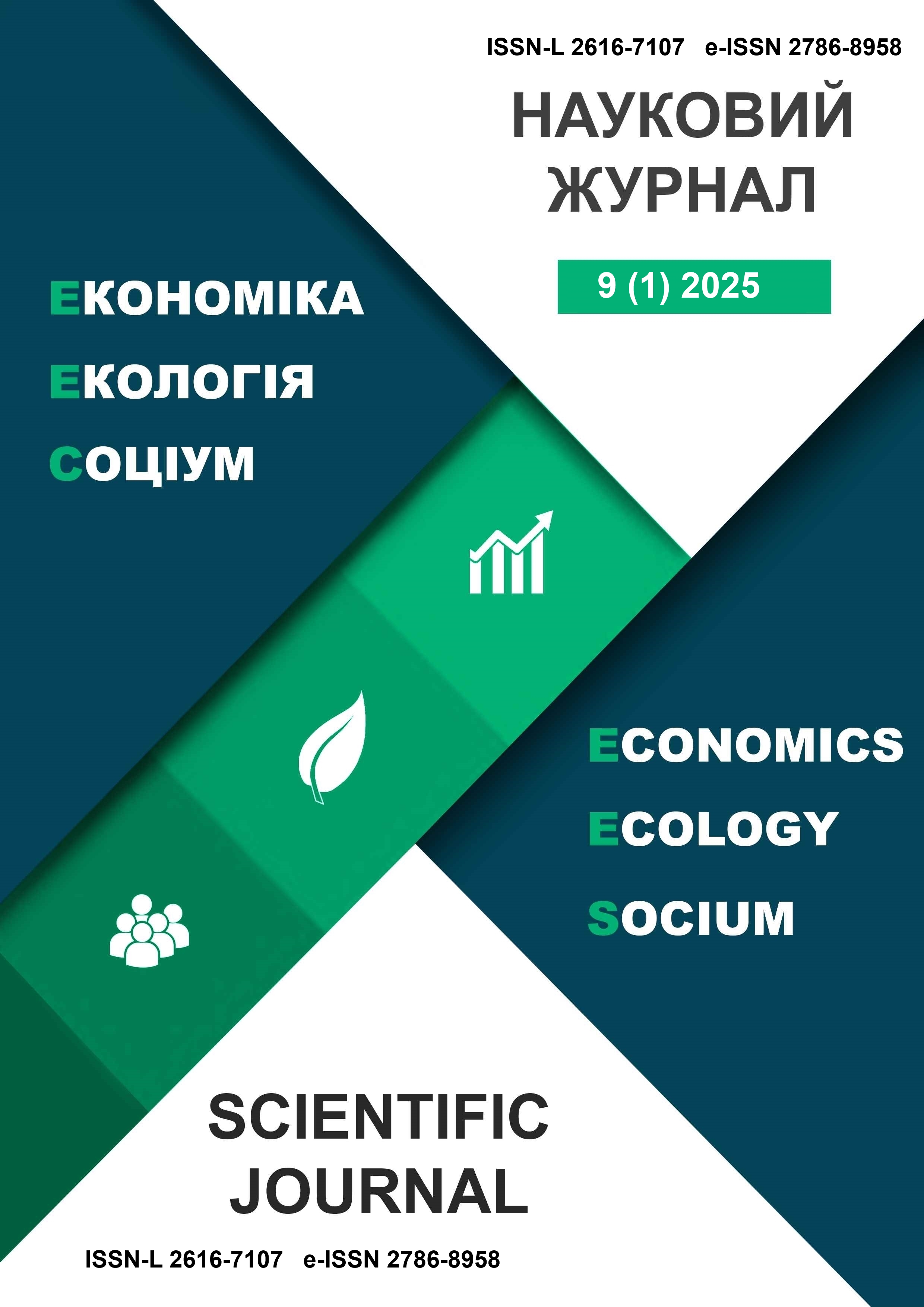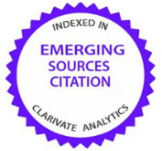Corporate Social Responsibility Management and Business Strategies in Sustainable Economic Development
Abstract
Introduction. Corporate social responsibility (CSR) management is pivotal for the strategic development of the national economy and the sustainability of companies. Considering the intensification of environmental and social issues, companies that integrate the principles of sustainable development into their activities can enhance their image and ensure long-term economic efficiency.
Aim and tasks. This study examines the key principles of corporate social responsibility management and their impact on the economic, social, and environmental development of companies. It also examines the role of CSR in sustainable economic development and its significance in establishing a socially responsible business environment.
Results. The adoption of CSR principles enhances business positions, as proven by the increase in the number of companies publishing CSR reports from 20% in 2011 to over 90% of S&P 500 companies in 2022. This contributes to positive economic dynamics, with the annual growth of legal entities reaching 8.5% between 2020 and 2023, while the number of private enterprises decreased by 0.2%. The key components of corporate reputational capital included product and service quality (20.2%), management quality (14.9%), citizenship (14.6%), financial success (13.4%), and innovation (13.3%). In 2023, the distribution of companies by CSR type was as follows: large Ukrainian enterprises (67%) and enterprises with foreign capital (18%) were the most common, while multinational corporations accounted for 13%, and medium-sized enterprises accounted for 2%. CSR has a positive impact on company performance, reflected in reputation (93.6%), quality (85.3%), innovation (83%), customer satisfaction (81.7%), productivity (80.4%), and market accessibility (71.3%).
Conclusions. CSR management is crucial for sustainable development and promotes responsible economic practices. The analysis of CSR projects of domestic companies in the context of sustainable development and social responsibility has identified key activities of the most socially responsible companies in Ukraine that provide charitable assistance to the population (74%), support medical services (54%), and organise leisure activities and resettlement (47%). The implementation of corporate social responsibility through innovations, social programs, and environmental initiatives not only adds value to businesses but also fosters favourable changes in the community and the environment.
Keywords:
corporate social responsibility, sustainability, corporate capital, corporate reputation, business strategy.References
Bai, Y., Wang, D., Sun, C., & Zhang, W. (2025). Corporate social responsibility under the influence of management tone. Finance Research Letters, 75(106831), 106831. https://doi.org/10.1016/j.frl.2025.106831
Birkinshaw, J., Bresman, H., & Håkanson, L. (2000). Managing the post‐acquisition integration process: How the human iintegration and task integration processes interact to foster value creation. The Journal of Management Studies, 37(3), 395–425. https://doi.org/10.1111/1467-6486.00186
Boiko, O. (2022). Corporate social responsibility during martial law. European Business Association. https://www.eba.com.ua
Bowen, H. (1953). Social responsibilities of the businessman. New York: Harper&Row, 270.
Business Insights. (2022). https://www.reptrak.com/globalreptrak/#2zzmhhdAPWprMriaiKHNlc
Carroll, A.B. (1979). A three-dimensional conceptual model of corporate performance. Academy of Management Review, 4(4), 500.
Carroll, A.B. (2001). The Pyramid of Corporate Social Responsibility: Toward the Moral Management of Organizational Stakeholders Business Horizons. http://bas.sagepub.com/cgi/content/refs/38/3/268
Chuprina, M. (2023). Corporate Social Responsibility: A Textbook. Kyiv: Igor Sikorsky Kyiv Polytechnic Institute.
Davis, K. (1960). Can Business Afford to Ignore Social Responsibilities? California Management Review, 2(3), 70–76.
DePamphilis, D. (2007). Mergers, acquisitions, and other restructuring activities. Academic Press, 744.
Doytch, N., & Cakan, E. (2011). Growth Effects of Mergers and Acquisitions: A Sector-level Study of OECD countries. Journal of Applied Economics and Business Research JAEBR, 1(3), 120–129.
Dzage, E. J., & Szabados, G. N. (2024). The Relationship of Corporate Social Responsibility with Business Performance – A Bibliometric Literature Review. Sustainability, 16(7), 2637. https://doi.org/10.3390/su16072637
Economic Development Agency PPV. (2023). Analytical Materials Navigator Knowledge Network. https://www.ppv.net.ua/uk/works_categories/analytical-studies/works
Huang, K., Sim, N., Zhao, H. (2020). Corporate social responsibility, corporate financial performance and the confounding effects of economic fluctuations: A meta-analysis. International Review of Financial Analysis, 70, 101504. https://doi.org/10.1016/j.irfa.2020.101504
Hutsaliuk, O., Tsaturian, R., Kalinin, O., Gedz, M., Buhaieva, M., Kramskyi, S., Navolokina, A. (2024). Technological Synergy of Engineering Integrating in Digitalization Economy, Nanotechnology and Intelligent Digital Marketing for Corporate Enterprises in Provisions of their Economic Security. Nanotechnology Perceptions, 20 (S8), 348–366. https://doi.org/10.62441/nano-ntp.vi.1295
ISO. (2023). ISO Social Responsibility. https://www.iso.org/sr
Kalinin, O., Gonchar, V., Abliazova, N., Filipishyna, L., Onofriichuk, O., & Maltsev, M. (2024). Enhancing economic security through digital transformation in investment processes: Theoretical perspectives and methodological approaches integrating environmental sustainability. Natural and Engineering Sciences, 9(1), 26–45. https://doi.org/10.28978/nesciences.1469858
Knell, A. (2006). Corporate Governance: How To Add Value To Your Company: A Practical Implementation Guide. Great Britain: CIMA Publishing, 337.
Kolodiziev, O., Shcherbak, V., Krupka, M., Kovalenko, V., Kolodizieva, T. & Yatsenko, V. (2023). The social responsibility of dual education in an unstable environment. International Journal of Human Capital in Urban Management, 8(3), 303-316. https://doi.org/10.22034/IJHCUM.2023.03.01
Korneyev, M., Pylypenko А., Popov, O., & Shmatko, N. (2019). Organized management of decentralized economic production systems with joint implementation of development projects. Eastern-European Journal of Enterprise Technologies, 4(3 (100), 22–35. https://doi.org/10.15587/1729-4061.2019.175765
Kryukova, I., Zamlynskyi, V., Vlasenko, T. (2023). Architecture of corporate reporting on the sustainable development of business entities in the agrarian sector as a tool of sustainable agri-management. Ekonomika APK, 30(2), 38–48. https://doi.org/10.32317/2221-1055.202302038
Licandro, O., Vázquez-Burguete, J-L., Ortigueira, L. and Correa, P. (2023). Definition of Corporate Social Responsibility as a Management Philosophy Oriented towards the Management of Externalities: Proposal and Argumentation. Sustainability, 15, 10722. https://doi.org/10.3390/su151310722
Nyame-Asiamah, F., & Ghulam, S. (2020). The relationship between CSR activity and sales growth in the UK retailing sector. Social Responsibility Journal, 16(3), 387–401. https://doi.org/10.1108/SRJ-09-2018-0245
Nyeadi, J.D., Ibrahim, M., Sare, Y.A. (2018). Corporate social responsibility and financial performance nexus: Empirical evidence from South African listed firms. Journal of Global Responsibility, 9(3), 301–328. https://doi.org/10.1108/JGR-01-2018- 0004
Shi, G., Sun, J., Zhang, L., & Jin, Y. (2017). Corporate social responsibility and geographic dispersion. Journal of Accounting and Public Policy, 36(6), 417–428. https://doi.org/10.1016/j.jaccpubpol.2017.09.001
State Statistics Service of Ukraine. (2023). http://www.ukrstat.gov.ua
Szőcs, I., Gabriela, M. (2025). Montanari Price-related consequences of corporate social (ir)responsibility. Journal of Business Research, 186, 114985. https://doi.org/10.1016/j.jbusres.2024.114985
United Nations Global Compact. (2023). The Ten Principles of the UN Global Compact. https://unglobalcompact.org/what-is-gc/mission/principles
Wang, H., Wang, L., Huang. D. (2024). Can corporate social responsibility and corporate governance structure reduce corporate legal risk? Finance Research Letters. 106598. https://doi.org/10.1016/j.frl.2024.106598
Wirba, A. V. (2023). Corporate social responsibility (CSR): The role of government in promoting CSR. Journal of the Knowledge Economy, 15(2), 7428–7454. https://doi.org/10.1007/s13132-023-01185-0
If the article is accepted for publication in the journal «Economics. Ecology. Socium» the author must sign an agreementon transfer of copyright. The agreement is sent to the postal (original) or e-mail address (scanned copy) of the journal editions.






















